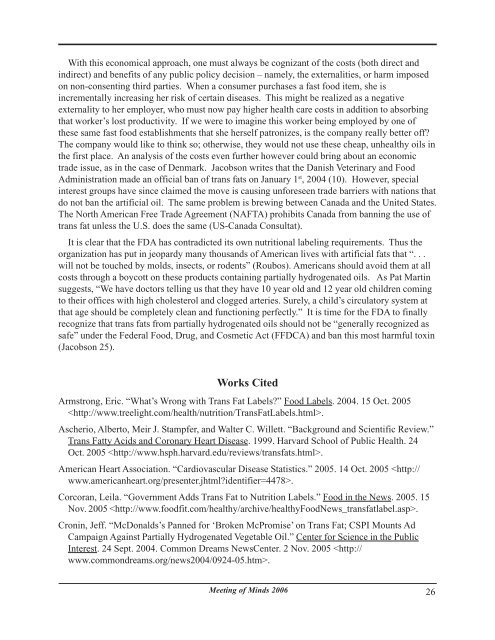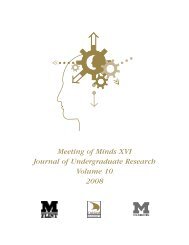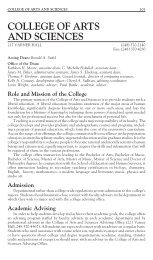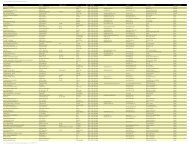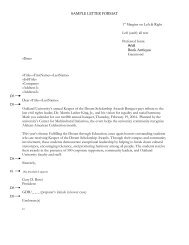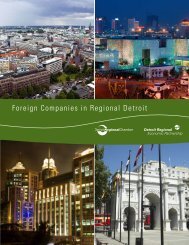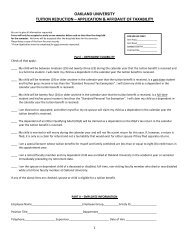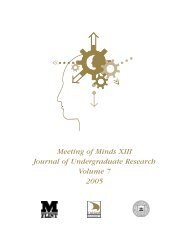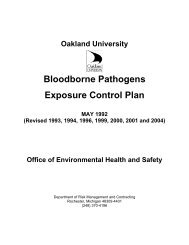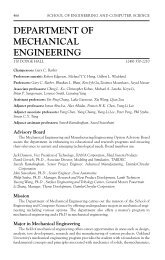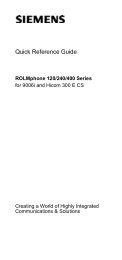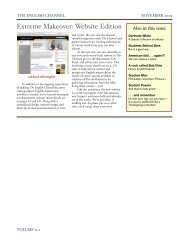MOM 2006 journal for pdf.pmd - University of Michigan-Flint
MOM 2006 journal for pdf.pmd - University of Michigan-Flint
MOM 2006 journal for pdf.pmd - University of Michigan-Flint
You also want an ePaper? Increase the reach of your titles
YUMPU automatically turns print PDFs into web optimized ePapers that Google loves.
With this economical approach, one must always be cognizant <strong>of</strong> the costs (both direct and<br />
indirect) and benefits <strong>of</strong> any public policy decision – namely, the externalities, or harm imposed<br />
on non-consenting third parties. When a consumer purchases a fast food item, she is<br />
incrementally increasing her risk <strong>of</strong> certain diseases. This might be realized as a negative<br />
externality to her employer, who must now pay higher health care costs in addition to absorbing<br />
that worker’s lost productivity. If we were to imagine this worker being employed by one <strong>of</strong><br />
these same fast food establishments that she herself patronizes, is the company really better <strong>of</strong>f?<br />
The company would like to think so; otherwise, they would not use these cheap, unhealthy oils in<br />
the first place. An analysis <strong>of</strong> the costs even further however could bring about an economic<br />
trade issue, as in the case <strong>of</strong> Denmark. Jacobson writes that the Danish Veterinary and Food<br />
Administration made an <strong>of</strong>ficial ban <strong>of</strong> trans fats on January 1 st , 2004 (10). However, special<br />
interest groups have since claimed the move is causing un<strong>for</strong>eseen trade barriers with nations that<br />
do not ban the artificial oil. The same problem is brewing between Canada and the United States.<br />
The North American Free Trade Agreement (NAFTA) prohibits Canada from banning the use <strong>of</strong><br />
trans fat unless the U.S. does the same (US-Canada Consultat).<br />
It is clear that the FDA has contradicted its own nutritional labeling requirements. Thus the<br />
organization has put in jeopardy many thousands <strong>of</strong> American lives with artificial fats that “. . .<br />
will not be touched by molds, insects, or rodents” (Roubos). Americans should avoid them at all<br />
costs through a boycott on these products containing partially hydrogenated oils. As Pat Martin<br />
suggests, “We have doctors telling us that they have 10 year old and 12 year old children coming<br />
to their <strong>of</strong>fices with high cholesterol and clogged arteries. Surely, a child’s circulatory system at<br />
that age should be completely clean and functioning perfectly.” It is time <strong>for</strong> the FDA to finally<br />
recognize that trans fats from partially hydrogenated oils should not be “generally recognized as<br />
safe” under the Federal Food, Drug, and Cosmetic Act (FFDCA) and ban this most harmful toxin<br />
(Jacobson 25).<br />
Works Cited<br />
Armstrong, Eric. “What’s Wrong with Trans Fat Labels?” Food Labels. 2004. 15 Oct. 2005<br />
.<br />
Ascherio, Alberto, Meir J. Stampfer, and Walter C. Willett. “Background and Scientific Review.”<br />
Trans Fatty Acids and Coronary Heart Disease. 1999. Harvard School <strong>of</strong> Public Health. 24<br />
Oct. 2005 .<br />
American Heart Association. “Cardiovascular Disease Statistics.” 2005. 14 Oct. 2005 .<br />
Corcoran, Leila. “Government Adds Trans Fat to Nutrition Labels.” Food in the News. 2005. 15<br />
Nov. 2005 .<br />
Cronin, Jeff. “McDonalds’s Panned <strong>for</strong> ‘Broken McPromise’ on Trans Fat; CSPI Mounts Ad<br />
Campaign Against Partially Hydrogenated Vegetable Oil.” Center <strong>for</strong> Science in the Public<br />
Interest. 24 Sept. 2004. Common Dreams NewsCenter. 2 Nov. 2005 .<br />
Meeting <strong>of</strong> Minds <strong>2006</strong> 26


